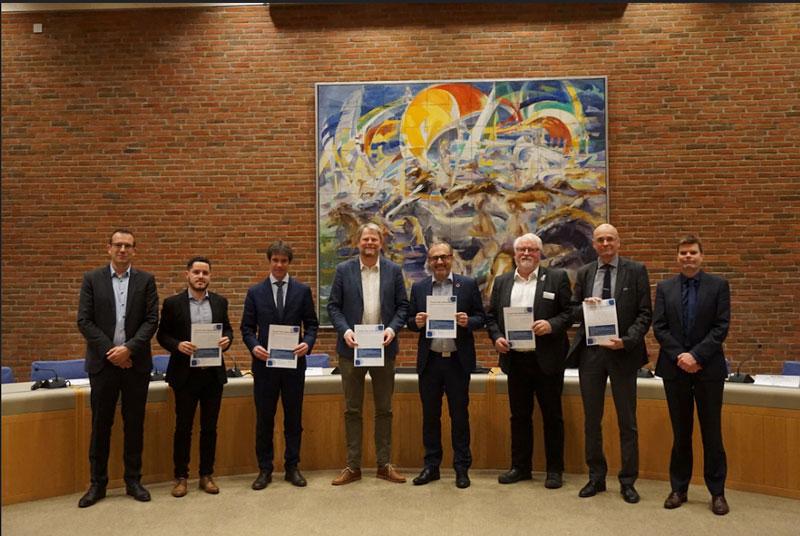CityLoops is a new EU-funded project focusing on organic, and construction and demolition waste
Høje-Taastrup and Roskilde (Denmark), Mikkeli (Finland), Apeldoorn (the Netherlands), Bodø (Norway), Porto (Portugal) and Seville (Spain) are the seven European cities that will pilot a series of demonstration actions on construction and demolition waste (CDW) and organic waste (OW) with the aim of achieving material circularity. Over 30 new tools and processes will be tested as part of CityLoops, an EU-funded project with 28 partners involved, that has just kicked-off and will run until September 2023.
– Construction and demolition waste (CDW) – including soil – and organic waste (OW) are two of the most significant urban material flows with a remarkable environmental impact in European cities. The EU-funded CityLoops project will develop a series of innovative procedures, approaches and open access and open source tools to embed circularity within planning and decision-making processes for CDW and OW in cities. The ultimate goal is to drive the transition to a circular economy.
The seven pilot cities – all of them small- to medium-sized ones – will structure their pilots in three phases: inception and preparation phase, including a series of preparatory analysis and stakeholder mapping and participatory planning; demonstration phase, when the solutions will be implemented and tested, and replication phase, when the CityLoops measures will be upscaled at regional and European level. The solutions and actions go from instruments for predicting future excavated CDW and soil production, to awareness-raising campaigns, circularity decision-making support tools, simulation of impacts 3D visualisation tools and procurement guidelines for OW products. A total of ten demonstration actions will be implemented, testing over 30 new tools and processes.
Alongside these, a sector-wide circularity assessment and an urban circularity assessment will be carried out in each of the cities. The former will help to optimise the demonstration activities, whereas the latter will enable cities to effectively integrate circularity into planning and decision making.
Another key aspect of CityLoops is circular procurement: the seven demonstrator cities will explore how public sector purchases can create markets for innovative circular economy products and solutions – from more circular design and increasing the use of recycled content in products, to ensuring reparability, reuse and appropriate recycling of products and materials, and promoting servicisation models. The active involvement of key stakeholders in every stage of the project will be also of crucial importance.
“CityLoops aims to provide a tested blueprint for promoting circularity which other local and regional governments across Europe can follow,” said Simon Clement, coordinator at ICLEI – Local Governments for Sustainability, a city-network responsible for leading the CityLoops project.
Circular Cities Declaration
Political representatives from the demonstrator CityLoops cities, as well as from Vallès Occidental (Spain) – one of the ‘followers’ of the project together with Murcia (Spain) – gathered last week to sign a ‘Circular Cities Declaration’. Through their signatures, they commit to enhancing the circular economy through policy and regulatory levers; to initiating a series of innovative pilot and demonstration activities to help identify the most promising solutions; to sharing knowledge with peers, and to building a wider circular cities coalition with key stakeholders and initiatives across Europe.
Background information on CDW and OW
CDW is, in volume terms, the most significant waste fraction in Europe. According to Eurostat (2015), in 2012 construction and demolition activities were responsible for 32% of all waste generated in the EEA, with a further 27% from mining and quarrying. Resource consumption for buildings and infrastructure in Europe is highly material intensive, consuming between 1.2 and 1.8 billion tonnes of materials per annum in Europe (Ecorys, 2014). The construction sector is also economically important, contributing on average 5–13% of the total (gross) value added (Eurostat, 2015).
Regarding OW, according to the European Commission the European Union produces approximately 130 Mt of organic waste per year, a number that is projected to have increased by 10% by 2020. Organic waste consists of organic fractions of municipal solid waste (OMSW) as well as organic waste from commercial sources and public spaces. Overall, 68% of organic waste produced annually in the EU consists of food waste originating from food manufacturing and packaging processes (39%), household scraps (42%), and restaurants/grocery stores (19%).
For more information contact us:
Mrs. Anitta Sihvonen
Mikkeli development Miksei Ltd

